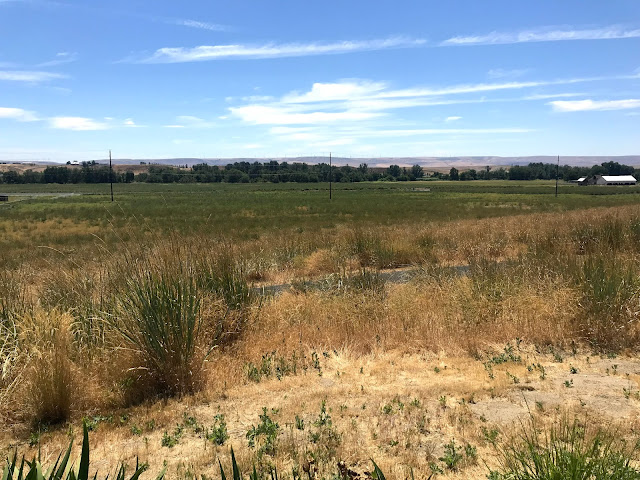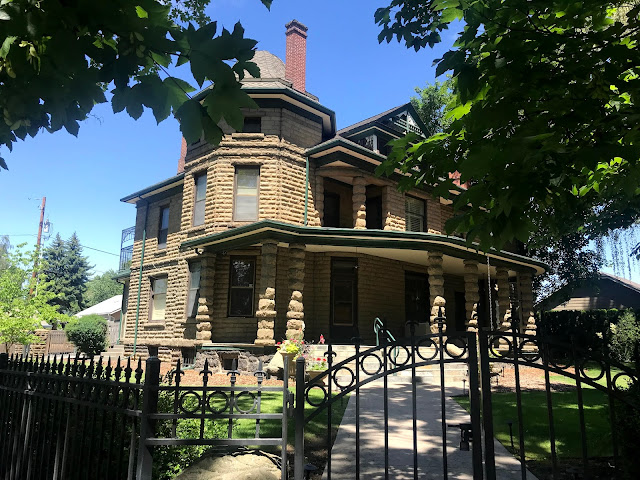We wanted our day in Walla Walla to be extra special, so we got in the car mid-morning and set off to see what we could see. Our first stop was the site of the town of Frenchtown.
Frenchtown was a mixed-marriage, multi-lingual community of French Canadian trappers, traders, and indigenous women who settled here in the 1820's. Frenchtown was never an official town, but rather a collection of log cabins scattered along the Walla Walla river, interspersed with Cayuse Indian camps. There were at one time some 50 cabins in the community. All that is left is a memorial marking the site and listing the known names of residents who were buried in the nearby cemetery.
Although many French Canadien trappers had moved into the area, they didn't initially bring with them the concept of land ownership, but simply adopted the Indigenous method of recognizing common land use as required by the community. As the Anglo population increased, the concept of "long lot" ownership was put into place, where each farmer claimed a long, thin strip of land abutting a river, thereby maximizing the number of farms with access to the river, which was the principal "road".
This idea of land ownership conflicted with the Indians way of life and led to innumerable conflicts. In 1836, Marcus and Narcissa Whitman arrived to bring Christian beliefs to the tribes. Failing at this, Marcus shifted to ministering to new immigrants, leading to an influx of diseases, mainly measles, that killed a vast majority of the local Cayuse tribes. Indian culture indicated that if a sick person in the care of another person died, the caretaker would be killed in retribution. With this in mind, and armed with a knowledge of loss of land, a group of suspicious Cayuse killed Marcus and Narcissa Whitman and eleven others on November 29, 1847.
In 1855, the longest Indian battle in the history of Washington Territory was fought just west of the town of Walla Walla from the 7th to the 10th of December. During the four-day standoff, Chief Peo Peo Mox Mox of the Walla Walla tribe agreed to become a hostage to prevent an immediate attack on his village. His trust was betrayed by the US Army, and Peo Peo Mox Mox and eleven other hostages were killed, mutilated and dismembered. Eventually, the indians retreated, the conflict eased, and treaties were signed (and then broken).
The overlook near the Battle of Walla Walla is a place of contemplation and regret, marked by well tended flowers.
The Walla Walla river traces a route of the Oregon Trail.
Co-incidently, the house is only a few blocks east of downtown, and the Walla Walla Bread Company, where we ate lunch!
Lunch was so-so. It seems that downtown WW has high aspiration as a destination town. Local wineries number over a hundred (although, as people familiar with California's Napa Valley, we were at a bit of a loss as to how you can make and bottle wine without having a lot of vineyards in the area...). Downtown WW is jammed cheek by jowl with tasting rooms. Not many restaurants or shops, but dozens of wine tasting places. If you want to purchase, advertising tells us you can get a great deal on case lots! Kinda strange. Reminds us of the old days of Barkers on the sidewalk hustling a show "inside"!
Walking back to our car, we noticed an odd building across the street. As I took this photo, a gentleman approached and began to tell me about his childhood in Walla Walla, and how this was the town theater! He reminisced over many a Saturday movie in plush velvet seats and throwing popcorn from the balcony!
It now houses offices and a couple of small downstairs shops.

So, there you have it. Walla Walla Washington in 36 hours. This town of 35,000 is four and a half hours from Seattle, and about 6 miles north of the Oregon border and thrives on tourism and agriculture. Wheat grown in The Palouse is still a major player in the area. Even though there are dozens of things we haven't seen in town, we're leaving tomorrow. See Ya!







No comments:
Post a Comment